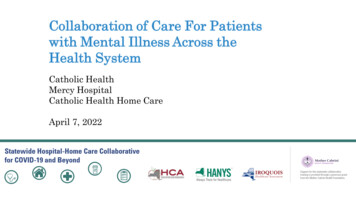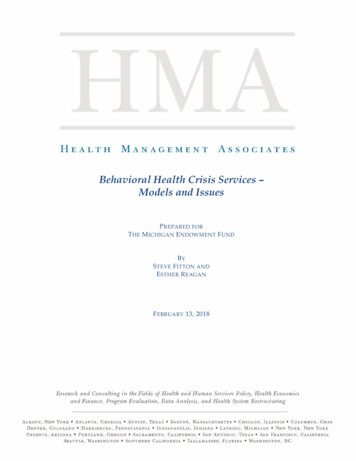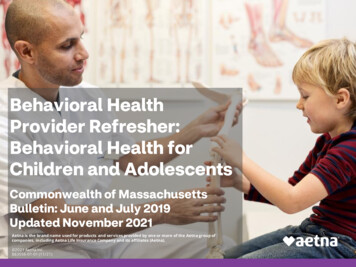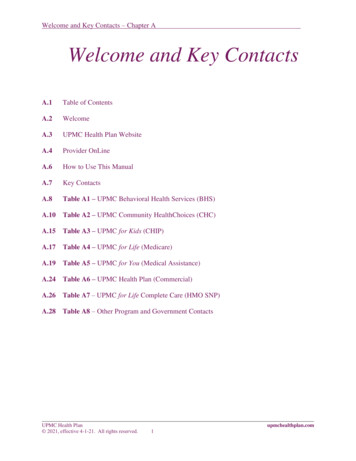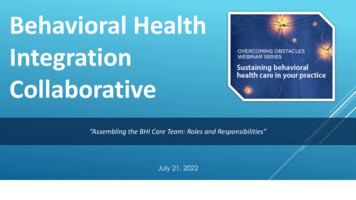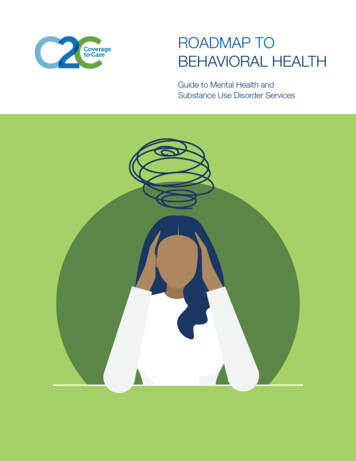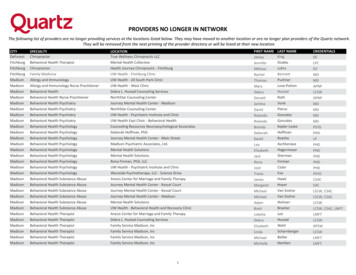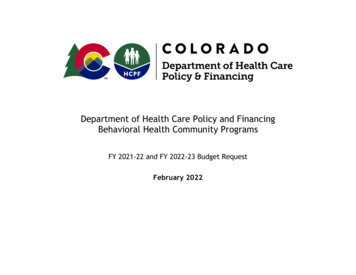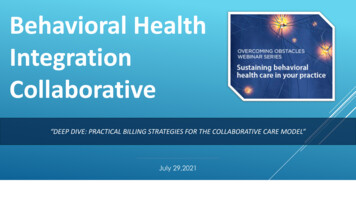
Transcription
Behavioral HealthIntegrationCollaborative“DEEP DIVE: PRACTICAL BILLING STRATEGIES FOR THE COLLABORATIVE CARE MODEL”July 29,2021 2020 American Medical Association. All rights reserved.
DISCLAIMER AND NOTICESThis Webinar is being made available to the general public and is for informational purposes only. The viewsexpressed in this Webinar should not necessarily be construed to be the views or policy of the AMA.The information in this Webinar is believed to be accurate. However, the AMA does not make any warrantyregarding the accuracy or completeness of any information provided in this Webinar. The information is providedas-is and the AMA expressly disclaims any liability resulting from use of this information. The information in thisWebinar is not, and should not be relied on as, medical, legal, or other professional advice, and viewers areencouraged to consult a professional advisor for any such advice.No part of this Webinar may be reproduced or distributed in any form or by any means without the prior writtenpermission of the AMA.All rights reserved. AMA is a registered trademark of the American Medical Association.2 2020 American Medical Association. All rights reserved.
About the BHI CollaborativeThe BHI Collaborative was established by several of the nation’s leading physicianorganizations** to catalyze effective and sustainable integration of behavioral andmental health care into physician practices.With an initial focus on primary care, the Collaborative is committed to ensuring aprofessionally satisfying, sustainable physician practice experience and will act as atrusted partner to help them overcome the obstacles that stand in the way ofmeeting their patients’ mental and behavioral health needs.**American Academy of Child & Adolescent Psychiatry, American Academy of Family Physicians, American Academy of Pediatrics,American College of Obstetricians and Gynecologists, American College of Physicians, American Medical Association,American Osteopathic Association, and the American Psychiatric Association. 2020 American Medical Association. All rights reserved.
TODAY’S SPEAKERSAnna Ratzliff, MD, PhDSebastian HainesCo-DirectorDirector of Program Operations,Primary Care Service LineAIMS Center, University ofWashington 2020 American Medical Association. All rights reserved.Penn Medicine
OVERVIEW OFCOLLABORATIVE CARE MODEL(CoCM) 2019 American Psychiatric Association. All rights reserved.
COLLABORATIVE CARE TEAMPCPPatientBHP/Care ManagerPsychiatricConsultantNew Roles University of Washington6 2019 American Psychiatric Association. All rights reserved.
PRINCIPLES OF COLLABORATIVE CAREPopulation-Based CareMeasurement-Based Treatment toTargetPatient-Centered CollaborationEvidence-Based CareAccountable CarePrinciples University of Washington7 2019 American Psychiatric Association. All rights reserved.
COLLABORATIVE CARE:FINANCIAL SUSTAINABILITY
COSTS FOR COLLABORATIVE CAREInitial Costs of Practice Change: provider and administrator time to plan for changecare team training costs and time/workforce developmentdevelopment of registryworkflow planning, billing optimizationOngoing Care Delivery Costs: care manager time psychiatric consultant time administration time and overhead (including continuousquality improvement efforts)9 2019 American Psychiatric Association. All rights reserved.
COLLABORATIVE CARE FINANCINGAND SUSTAINABILITYCreate a strong collaborative care programPsychiatric ConsultationBehavioral Health Care ManagerCore InfrastructureDefine value broadlyQuality patient and providerexperienceBetter outcomesCapture value and responsiblespendingUse financial modeling toolCalculate costsAnticipate RevenueConsider workflows 2019 American Psychiatric Association. All rights reserved.
PAYMENT FOR COLLABORATIVE CAREFully capitated:All costs covered by organization; pays outright for services to be deliveredPartially capitated:PCP bills FFS; clinics get payment for care management resourcesCase rate payment:For care management and psychiatric consultationValue-based payments:Payment for quality of services and better patient outcomes over volumeof servicesDirect Billing:Traditional FFSCoCM Codes 2019 American Psychiatric Association. All rights reserved.
THE QUADRUPLE AIM:DEFINE VALUE BROADLYPatient OutcomesHigh Quality of CareImproved Patient OutcomesPatient ExperienceMental Health Care AccessImproved Patient ExperienceProvider ExperienceImproved Provider ExperienceImproved Primary Care Provider ProductivityCost EffectivenessNew Funding OpportunitiesHealth Care Savings12 2019 American Psychiatric Association. All rights reserved.
PAYMENT FOR THE COLLABORATIVECARE MODEL IN PRIMARY CARE 2019 American Psychiatric Association. All rights reserved.
MEDICARE CoCM BILLINGCore Components1. Active treatment andcare management for anidentified patientpopulation2. Use of a patient trackingtool to promote regular,proactive outcomemonitoring andtreatment-to-target2021CodeDescriptionNon FacilityRate99492* CoCM - first 70 min in first month 154.23CoCM - first 60 min in anysubsequent months 154.2399493*CoCM - each additional 30 min in any99494* month (used in conjunction with99492 or 99493)G2214*99484 58.97CoCM – first 30 min in first orsubsequent month 64.55Other BH services - 20 min per month 46.76For FQHC and RHC Only3. Regular (typicallyweekly) systematicpsychiatric caseloadreviewsG0511CoCM – General Care Management 65.25G0512CoCM: Psychiatric Collaborative CareModel 154.23*CPT time rule applies; allows for billing of service at 50% plus 1 minute (i.e. 36 minutes for thefirst month14 2019 American Psychiatric Association. All rights reserved.
COCM CODES Payment goes to the PCP who bills the service Billed on a per patient basis for those that have met theestablished time thresholds The psychiatrist does not bill separately.– contract with the PCP practice The patient must provide general consent for the service andthey may have a co-pay Interaction does not have to be face-to-face BH care manager and psychiatrists can also bill additional codesfor therapy etc. Some differences in the FQHC and RHC setting 2019 American Psychiatric Association. All rights reserved.
TIME The CPT codes for CoCM are billed based on the time spent by the caremanager on clinical activities for an individual patient over the course of amonth. The “CPT time rule” allows for the billing of the service at 50% plus 1 minute oftime. The add-on code, 99494 is billed for each additional 30 minutes beyond thetotal time listed for 99492 or 99493. CMS has instituted an appealablemedically unlikely edit or MUE that limits the use of the add-on code to twoinstances/patient in any given month. The CPT time rule does not apply to the general behavioral integration code,99484. You bill that code when you have spent at least 20 minutes over thecourse of the month providing clinical care. FQHCs and RHCs require you to meet the full 70 minute and 60 minute timerange for the 99492 and 99493 mark prior to billing and do not allow foradditional time.16 2019 American Psychiatric Association. All rights reserved.
VALUATION ANDPAYMENT
PAYERS: MEDICARE AND MEDICAIDMedicare (Traditional FFS) (100% coverage)Medicare Advantage PlansFQHCs/RHCsMedicaid (as of 7/21) ArizonaCaliforniaDelaware* DelayedHawaii* LimitedIllinois* DelayedIowaKansasKentuckyMaryland* Limited MassachusettsMichiganMontanaNebraskaNew HampshireNew JerseyNew YorkNorth CarolinaOhio* LimitedPennsylvania Rhode IslandTexas (2022)UtahWashington 2019 American Psychiatric Association. All rights reserved.
PAYERS: COMMERCIALCommercial Payers Include Aetna Anthem Beacon BC ID BCBS (DC, DE, IL, MA, MD, MI, MT, NC, ND, NJ, NM, OK, SC, TX) Care First BCBS (MD, DC, DE) Cigna (limited pilot) Emblem GHI PPO Fidelis (Commercial & Public Sector) HealthPartners (MN)HumanaIndependence BCBSMagellanPreferredOneQualCareRegence Blue Shield (ID, OR, UT,WA)TricareUCareUnited Healthcare/OptumWellcare Health Plans, Inc.This list has been compiled based on reports from the field. Coverage varies by individual insurance plan, so it isimperative that practices verify coverage on a payer-by-payer basis. This list does not include managed Medicaid.To download APA’s payer doc directly, visit: psychiatry.org/CoCMpayersNote: check your downloads file 2019 American Psychiatric Association. All rights reserved.
CASE: ADDRESSING CLINICALWORKFLOW FOR COLLABORATIVECARE
ANYTOWN CLINIC – SEPT 5A 53-year-old man, Mr. A, presents to his PCP with a chief complaint of “not sleeping enough, having headaches, andfeeling run down.” For the last 4 months, he has been waking up too early in the morning and cannot get back tosleep. During the day he is exhausted and is having trouble focusing when he’s at work. His chronic back pain hasincreased, so he has been staying at home and has stopped exercising. He has tried everything he can think of to“break out of this rut,” but feels like it is pointless and is ready to give up.The PCP administers a PHQ-9 (Mr. A scored 18) and then asks Mr. A about suicidality. After discussing the symptomson the PHQ-9, Mr. A says that he never thought of himself as depressed before.The primary care provider expresses confidence to Mr. A that he will be able to improve and introduced Mr. A to thebehavioral health care manager (BHCM) for further evaluation and treatment and consents him to engage in the clinicCoCM program. University of Washington 2019 American Psychiatric Association. All rights reserved.
SUMMARY OF BILLINGDateSept 5Case DetailsInitial presenting visitwith PCPMinutes and OtherRelevant Billing CodesAlways bill E&M codeas appropriate for PCPvisitsBillable BHCMProvider NO Billable BHCMPsychotherapyProvider and/or CoCM CPT CoCM CPT codescodesONLYNot BillableNot Billable University of Washington 2019 American Psychiatric Association. All rights reserved.
SEPT 5 CONTINUEDThe BHCM sees Mr. A for a warm handoff visit to engage Mr. A and schedule time for afull intake in the future. Enters patient into the registry (done at the end of eachencounter between the patient and BHCM). University of Washington 2019 American Psychiatric Association. All rights reserved.
SUMMARY OF BILLINGDateCase DetailsMinutes and OtherRelevant Billing CodesBillable BHCMProvider NO Billable BHCMPsychotherapyProvider and/or CoCM CPT CoCM CPT codescodesONLYSept 5Initial presenting visitwith PCPAlways bill E&M codeas appropriate for PCPvisitsSept 515-minute visitThe BHCM records 20 The BHCM records The BHCM recordsminutes towards20 minutes towards20 minutesCoCMCoCMtowards CoCM5 minutes registryNot BillableNot Billable University of Washington 2019 American Psychiatric Association. All rights reserved.
SEPT 8The BHCM conducts a comprehensive assessment of Mr. A and learns that he has been more irritable at home withhis wife and children for the past six months. He has also stopped going out with friends. In the last two weeks he hasbeen late to work four times because he can’t get himself to get started in the morning.As part of the initial comprehensive assessment, the BHCM administers screening instruments for PTSD (PCL-C), andbipolar disorder (CIDI-3), both of which were negative. The BHCM screens for alcohol use disorder with the AUDIT-Cand other substance use disorders with appropriate questionnaires. All are negative, but Mr. A reports that he hasstarted smoking cigarettes again.The BHCM and Mr. A discuss the provisional diagnosis of major depression and its treatment, as well as theconnections between depression and chronic pain. University of Washington 2019 American Psychiatric Association. All rights reserved.
SUMMARY OF BILLINGDateCase DetailsSept 8Initial assessment with BHcare managerMinutes and OtherRelevant Billing Codes45-minute visit5 minutes registryBillable BHCM Provider- Psychotherapy and/orCoCM CPT codesNO Billable BHCMProvider CoCM CPT codes ONLYThe BHCM bills for aninitial assessment with90791 5 min CoCMORThe BHCM records 50minutes towards CoCMThe BHCM records 50minutes towardsCoCM University of Washington 2019 American Psychiatric Association. All rights reserved.
MR. A CONTINUEDSEPT 9: The next day the BHCM and Psychiatric Consultant (PC) discuss Mr. A’s presentation during weekly casereview. The PCP had asked whether fluoxetine could be appropriate for Mr. A. The PC suggests considering bupropionas an initial antidepressant given its efficacy for both treating depression and in supporting smoking cessation. Atitration schedule is provided to escalate the dose to the therapeutic range and monitor response with a PHQ-9 overfour to six weeks. The PC completes the recommendation in the EMR and alerts the PCP to it via electronicmessaging. No PC time is counted towards CoCM since this is not the work of the BHCM.SEPT 16: The BHCM meets Mr. A for another session and Problem Solving Treatment (PST) is started. This is to targetMr. A’s goal of re-engaging in work and social activities. After the session, which was productive, Mr. A agreed to meetvia phone in two weeks. University of Washington 2019 American Psychiatric Association. All rights reserved.
SUMMARY OF BILLINGMinutes and Other RelevantBilling CodesDateCase DetailsSept 9The next day the BHCM and5 minutes BHCM prep timePsychiatric Consultant (PC)discuss Mr. A’s presentation10-minute consultduring weekly case review.No PC time is counted towards 5 minutes registryCoCM since this is not thework of the BHCM.Sept 16The BHCM meets Mr. A foranother session and ProblemSolving Treatment (PST) isstarted.30-minute visit5 minutes registryBillable BHCM Provider Psychotherapy and/orCoCM CPT codesNO Billable BHCMProvider CoCM CPT codes ONLYNot billable withpsychotherapy codesORThe BHCM records 20minutes towards CoCMThe BHCM records 20minutes towards CoCMThe BHCM bills for a 30minute psychotherapysession with code 90832 5min CoCMORThe BHCM records 35minutes towards CoCMThe BHCM records 35minutes towards CoCM University of Washington 2019 American Psychiatric Association. All rights reserved.
MR. A CONTINUEDSEPT 17: The BHCM organizes a discussion with the PCP to review the PC’s recommendations for antidepressantmedication and to discuss the recent initiation of PST. Additionally, the BHCM asks the PCP to follow-up with Mr. A onPST progress at their visit the following week.SEPT 25: The PCP sees Mr. A for a follow up visit and prescribes bupropion SR 150mg daily. The PCP reinforced therole of the BHCM in coordinating care and the value of PST for depression.SEPT 27: The BHCM calls for a scheduled phone visit. The BHCM administers the PHQ-9 over the phone and recordsthe score as 16. The BHCM checks in with Mr. A both about starting medications and to reinforce PST skills. University of Washington 2019 American Psychiatric Association. All rights reserved.
SUMMARY OF BILLINGSept 17The BHCM organizes adiscussion with the PCP toreview recommendations.Asks the PCP to follow-upwith Mr. A the followingweek.5 minutes Care coordinationNot billable withpsychotherapy codesThe BHCM records 10minutes towards CoCM5 minutes registryORThe BHCM records 10minutes towards CoCMSept 25The PCP sees Mr. A for aAlways bill E&M code asfollow up visit and prescribes appropriate for a face-tobupropion SR 150mg dailyface visit with the PCPand reinforced the role of theBHCM.Sept 27The BHCM calls for ascheduled phone visit.10-minute phone callNot billableNot billableNot billable withpsychotherapy codesThe BHCM records 15minutes towards CoCM5 minutes registryORThe BHCM records 15minutes towards CoCM University of Washington 2019 American Psychiatric Association. All rights reserved.
SUMMARY OF MONTH 1 OF TREATMENTDateCase DetailsSummary of Mr. A has been engaged inMonth 1 of care, diagnosis has beenTreatment established and treatment hasbeen started.Minutes and OtherRelevant Billing Codes2 E&M visits45 minute visit30 minute visitOn the last day of the month75 minutes BHCM activitiesthe BHCM totals the time spentof the care of Mr. A.Billable BHCMProvider Psychotherapy and/orCoCM CPT codesNO Billable BHCMProvider CoCM CPT codesONLY2 PCP visits with E&Mcodes2 PCP visits with E&McodesBill 90791 x 1 (50 minutes) CoCM Code 99492 forand 90832 x 1 (30first month (70 minutes)minutes).ANDAND99494 x 2 (2 x 30CoCM code 99492 (70minutes)minutes) for first month ofCoCM treatment20 min unbillableOR90791 and 99492 99494x1OR90832 and 99492 99494x2 University of Washington 2019 American Psychiatric Association. All rights reserved.
APA/AIMS CENTERCOLLABORATIVE CARE RESOURCES
OFFICE HOURS – MONTHLY CALLSBilling/Financial Sustainability:First Wednesday of the Month from Noon – 1:00 p.m. Eastern TimeJoin Online: https://zoom.us/j/95007236406Telephone: (301) 715 8592Meeting ID: 950 0723 6406Implementation:Third Tuesday of Month from Noon – 1:00 p.m. Eastern TimeJoin Online: https://uw-phi.zoom.us/j/682654694Telephone: (646) 876 9923 or (669) 900 6833Meeting ID: 682 654 694Frequently Answered Questions from AIMS Office Hours 2019 American Psychiatric Association. All rights reserved.
APA COCM RESOURCESOnline Training in CoCM For Psychiatrists, PCPs, and Behavioral Health Care Managers Learning modules for specific populations (Pediatric, Substance Use Disorder, Geriatric,and Perinatal)Information on Coverage and Practice and Billing Toolkit List of payers who are paying the CoCM codes (Medicare, Medicaid, private payers) Practice and Billing Toolkit: Tools for successful implementation of the CollaborativeCare Model (documenting consent, scripts to introduce CoCM to patients,satisfaction surveys, time tracking, etc)To access all of APA’s Collaborative Care resources, visitpsychiatry.org/collaborate 2019 American Psychiatric Association. All rights reserved.
AIMS CENTER CoCM RESOURCESAIMS Center Website: https://aims.uw.edu/Billing and Financing: ancing- FAQs for Billing CoCM- Collaborative Care Billing Case StudyFinancial Modeling Workbooks: rategies/financial-modeling-workbook35 2019 American Psychiatric Association. All rights reserved.
BHI Collaborative “On Demand” Webinars The Value of Collaboration and Shared Culture in BHIBehavioral Health Billing & Coding 101: How to Get PaidImplementation Strategies for Virtual BHIFinancial Planning: Quantifying the Impact of BHIPhysicians Leading the Charge: Dismantling Stigma around Behavioral Health Conditions& TreatmentPrivacy & Security: Know the Rules for Communication of Behavioral Health InformationEffective BHI Strategies for Independent PracticesAdvancing Health Equity through BHIBolstering Chronic Care Management with BHIHow to Address the Growing Behavioral Health Concerns Among Children, Adolescents,and FamiliesWatch these webinars on the Overcoming Obstacles YouTube playlist now! 2020 American Medical Association. All rights reserved.36
Collaborative Resource – BHI CompendiumThe BHI Compendium serves as a tool to learn about behavioral healthintegration and how to make it effective for your practice and patients.Download Nowto learn how to make thebest decisions for themental health of yourpatients. 2020 American Medical Association. All rights reserved.37
Thank you for joining! 2020 American Medical Association. All rights reserved.
**American Academy of Child & Adolescent Psychiatry, American Academy of Family Physicians, American Academy of Pediatrics, American College of Obstetricians and Gynecologists, American College of Physicians, American Medical Association, . NC, ND, NJ, NM, OK, SC, TX) Care First BCBS (MD, DC, DE) Cigna (limited pilot) Emblem GHI .
